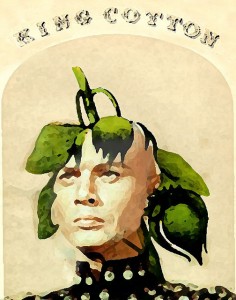As uprisings and near-revolts were popping up in various places throughout the Middle East over the past few months, there were many references to the “stirrings of democracy” in the statements of those leading the insurgencies. We Americans, who talk a lot about enabling or “exporting” democracy, have shaped our interpretation of that term over the 235 years of freedom that followed colonial rule.
But our definition of democracy is almost sure to be different, maybe even radically different, from that of others around the world.

Re-enactors mark the 80th anniversary of women's gaining the vote in America. Such ideas are just spreading to some parts of the world. (lynnefeatherstone, Flickr Creative Commons)
Hillary Rodham Clinton, who is now our secretary of State, once said, for instance, “There cannot be true democracy unless women’s voices are heard. There cannot be true democracy unless women are given the opportunity to take responsibility for their own lives.”
That viewpoint may or may not be shared by everyone who is “striving for democracy” elsewhere.
Considering this, I remembered covering a provocative symposium about American exports years ago, in which some of the panelists said that our very culture is the nation’s most profound — perhaps even revolutionary — export.

Cotton was once king in America and is still a viable export product. How Yul Brynner got into this image, I don't know. (andertoons, Flickr Creative Commons)
Not corn, tobacco, or steel — though sales of the first two are robust right now. You can argue quite convincingly that their impact on the world doesn’t come close to that of our music, celebrity entertainment, information technology — even fast food.
The forum that I mentioned was staged by the Center for Arts and Culture, a nonprofit research organization based in Washington that has since been absorbed by a larger cultural organization.
The panel’s moderator, Alberta Arthurs, began by noting that what we sometimes call “cultural diplomacy” had broadened to include aspects of popular American life that are not necessarily welcomed in all countries of the world.
“Cosmpolitanism,” she described it. No thank you, say the leaders of many decidedly uncosmopolitan societies.
Todd Gitlin, a professor of journalism and sociology at Columbia University, has taken a special interest in the influences of popular media. He told the audience that “cultural globalism” is nothing new.

Commercialism is one of our big exports, all right. But, as here in Kowloon, China, other folks had the idea just fine. (Dan.., Flickr Creative Commons)
“But the intensity of the process, and the scale in which it operates, and therefore the global consequences, are of a scale that was not imaginable a century ago,” he said. “American commercial culture in particular is a revolutionary force, and I don’t use that word lightly. Revolutions are, for insiders, thrilling. For outsiders, frequently frightening. They leave tumultuous and treacherous consequences.”
Gitlin said this whirlwind includes the Internet, which, time has amply proved, can launch commercial images, information, and ideas that the recipient nations consider offensive or even heretical, into many countries at once.

DeToqueville looks more like a French dandy than an intrepid traveler and chronicler of democracy. (Wikipedia Commons)
Alexis de Toqueville, the French political thinker who trooped around the young United States inspecting prisons in the early 19th Century — and got two thick books about American democracy from it — pointed out that American culture is dynamic, sometimes insistent or even rude, unpredictable and entertaining, attuned to what markets want, and, as Todd Gitlin interpreted him, “besotted by a fascination with celebrity.”
These traits, according to Gitlin and many others who have seen American influences abroad, have only intensified.
“Besotted with celebrity?” Imagine that!

It's not hard to see why there might indeed be wariness about SOME of our cultural exports. (ellyjonaz, Flickr Creative Commons)
When I say “this culture,” I mean everything from movies to popcorn to advertising, to the Internet, to [the cable music channel] MTV to American popular books and magazines and celebrities and so on. All that is so forceful that it forces other cultures to cope. There’s a demand for what America has to offer, and there’s also a protest against it. That’s a second reaction. It’s imported, and it’s also resisted, because it’s felt to be a typhoon. It’s felt to be a force that is not only unavoidable but destructive.
Or other cultures create hybrids, incorporating American styles into their own. So what was once American culture becomes transformed into hundreds of different varieties.

A perfect example is the KFC chicken phenomenon in China, where the brand that was once called “Kentucky Fried Chicken” is China’s largest restaurant chain. But it incorporates local specialties as well, including a “Beijing duck wrap” and soybean milk.
Ironically, such exports as American popular music — which you hear, in English, all over the world — were themselves the product of IMPORTS from Africa, Ireland, Jamaica, and elsewhere.
Jazz, the quintessential American music, for instance, evolved out of an assortment of African and European styles.
According to Bonnie Richardson, another speaker at that Center for Arts and Culture forum, critics fear that globalizing of cultures will bring about a kind of uniformity of what is acceptable and what is popular.

In this early folk painting, southern slaves dance to banjo and percussion instruments in a style that quite likely influenced the development of jazz. (Wikipedia Commons)
Not to worry, said Richardson, who was a vice president of the Motion Picture Association of America and has since retired. “Sure, they like our big action films,” she said. “And we’re glad they do. But they also like to see their own cultures, and their own histories, with their own language and their own accents reflected in their films.”
For instance, Richardson added, when new private television stations were first established in European nations that had known only state-run broadcasting, they leaned heavily on re-runs of American programs. Now both television in those countries and Hollywood are producing fresh programs in Europe and in the vernacular languages. More and more regional films are being commissioned throughout Latin America as well. Then, too, she noted, “As more filmed entertainment becomes available on the Internet, you decide what you want to see. And your choices are virtually limitless.”
Of the seven major Hollywood studios, Richardson pointed out, one’s parent company is Australian, another’s is Canadian, and a third’s is Japanese. “We don’t look at that as a threat to our culture,” she said. “But in other countries they look at foreign ownership as a really threatening issue.”
Charles Mann, a contributing editor to the Atlantic Monthly magazine, has written extensively about the overlap of science, technology, and commerce. He agreed that peoples of the world take things from other cultures and make them their own — a Mongolian child drawing Mickey Mouse with Asian features; Bolivians setting up Internet chat rooms in the jungle, using Finnish computer programming; Americans putting spaghetti in a can and adding a Swedish invention – the meatball.
When Americans discuss globalization, it’s often [in the context] of triumphalism or hand-wringing. The assumption is a cultural arrogance, that these people out there are simply waiting to be knocked over or waiting with open arms for whatever we want to give them. In fact when I travel around the world reporting, I see people again and again taking what they like, reshaping it to their own purposes and feeding it right back at us.”
The panel at the Center for Arts and Culture agreed that it can be dangerous to talk about a “demand” for American or any other cultural export. There was no demand, it was pointed out, for a novel about a great white whale. Yet it swept the world 40 years after Herman Melville’s death. To carve out niche markets in advance and then flood those markets with nuggets of American culture is risky, the panelists agreed, because truly creative products don’t fit into niches and will find their own markets.

This whole discussion reinforces the point that culture no longer means just a society’s greatest works — the achievements and performances it is most proud of. Oboe recitals, Shakespeare festivals, art exhibits — that sort of things. Bonnie Richardson went so far as to say that these days, culture is very often “the everyday reflection of who we are, what we like, and what we find funny.”
Following the formal presentations, however, one audience member, James Early a Smithsonian Institution cultural-heritage expert, asked the panel to remember that what may be culture in the broad sense — even if it becomes a worldwide phenomenon — is not necessarily something with lasting value worth cultivating.
I can think of a number of examples. Culture can be low culture, I’d say. But I’ll bite my metaphorical tongue for fear of offending anyone. Only problem is, some of the examples I have are “art forms” that are racing fastest and farthest around the globe.
Ted's Wild Words
These are a few words from this posting that you may not know. Each time, I'll tell you a little about them and also place them into a cumulative archive of "Ted's Wild Words" in the right-hand column of the home page. Just click on it there, and if there's another word that you'd like me to explain, just ask!
Besotted. Intoxicated, drunk. A sot is a habitual drunkard.
Heretical. Filled with heresy, espousing ideas that are radically different from accepted beliefs.


